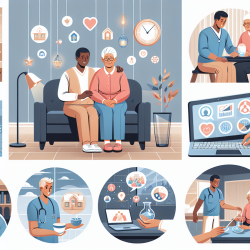Introduction
In the realm of assisted living, the well-being and safety of residents are paramount. Recent research on Resident-to-Resident Elder Mistreatment (R-REM) has shed light on the prevalence of negative interactions among residents, emphasizing the need for effective interventions. This blog delves into the findings of a pivotal study that explores the impact of staff training on reducing elder mistreatment and improving resident safety.
Understanding R-REM
R-REM is characterized by negative and aggressive interactions between residents in long-term care settings, which can lead to physical and psychological harm. The study conducted by Teresi et al. (2020) represents a significant step forward in addressing this issue, providing a comprehensive intervention for direct care staff in assisted living residences.
The Study: A Data-Driven Approach
The research involved a cluster randomized controlled trial across twelve assisted living facilities in New York. The intervention consisted of three training modules aimed at enhancing staff knowledge, recognition, and reporting of R-REM. The primary outcomes focused on reducing falls and injuries among residents, while process outcomes included increased staff knowledge and reporting of mistreatment incidents.
Key Findings and Implications
- Enhanced Staff Knowledge: Post-training assessments revealed a significant increase in staff understanding of R-REM, highlighting the effectiveness of the educational modules.
- Increased Reporting: The intervention group demonstrated a higher frequency of reported R-REM incidents, indicating improved recognition and reporting practices.
- Reduced Falls and Injuries: Facilities that implemented the intervention saw a notable decrease in resident falls and injuries, underscoring the positive impact of the training on resident safety.
Empowering Practitioners: Steps Forward
For practitioners in the field of elder care, this study offers valuable insights and actionable steps to enhance care quality:
- Adopt Evidence-Based Training: Implement training programs that focus on recognizing and managing R-REM to foster a safer environment for residents.
- Encourage Continuous Learning: Stay informed about the latest research and best practices in elder care to continuously improve service delivery.
- Promote a Culture of Reporting: Cultivate an environment where staff feel empowered to report incidents, ensuring timely interventions and support for affected residents.
Conclusion
The study by Teresi et al. (2020) highlights the transformative potential of data-driven interventions in elder care settings. By enhancing staff knowledge and reporting practices, we can create safer and more supportive environments for residents. Practitioners are encouraged to explore further research and integrate evidence-based strategies into their care practices.
To read the original research paper, please follow this link: Resident-to-resident elder mistreatment (R-REM) intervention for direct care staff in assisted living residences: study protocol for a cluster randomized controlled trial.










